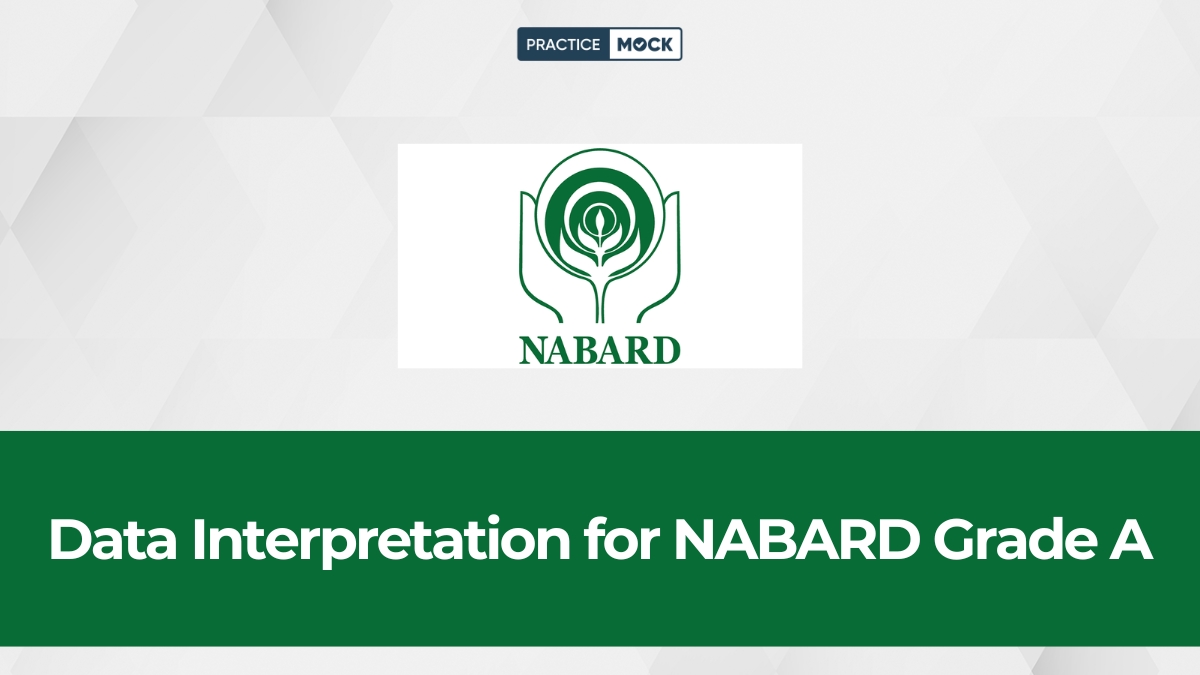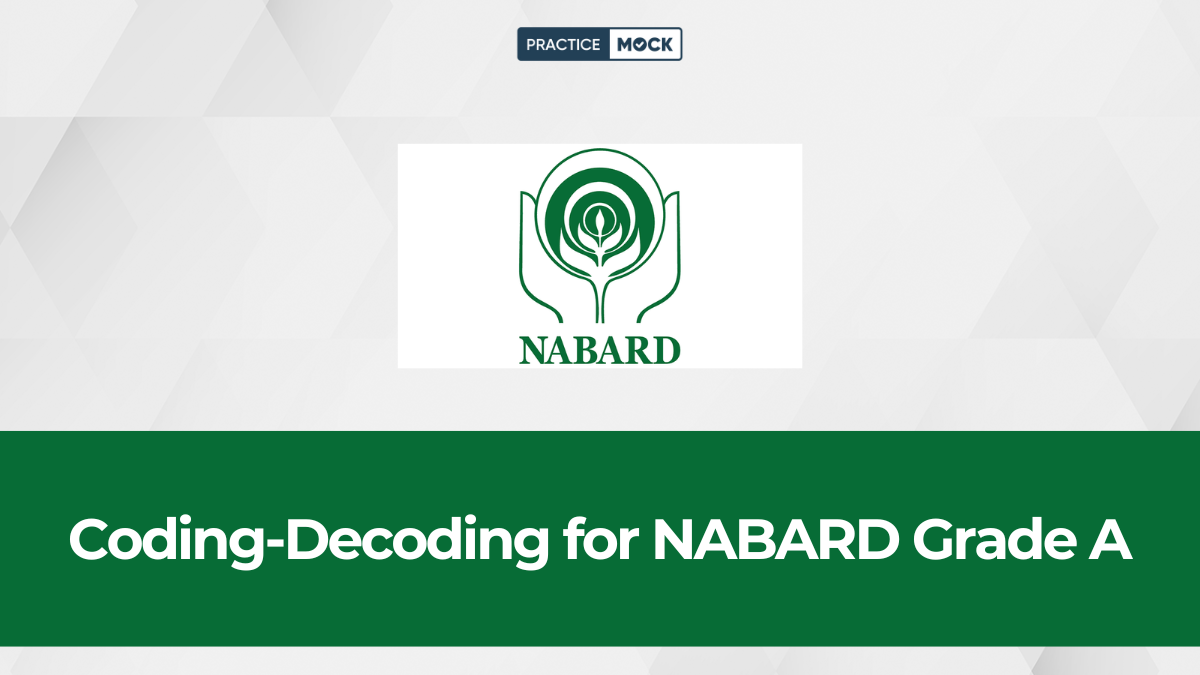NABARD Grade A Study Plan 2024 For 30 Days, Phase 2


NABARD Grade A Study Plan 2024
NABARD Grade A Study Plan 2024: NABARD Grade A 2024 Phase 2 exam will tentatively be conducted in October 2024. It is also called as mains Exam. It is an important step in the selection process. For the Generalist Officers exam, the NABARD Grade A Phase 2 consists of two Papers: Paper 1 and Paper 2. Paper I encompasses General English, which is a Descriptive Paper. It focuses on Essay and Precis Writing, Reading Comprehension, and Business or Office Correspondence. It is worth 100 marks with a total time limit of 90 minutes. On the other hand, Paper II tests candidates’ knowledge of Economic and Social Issues (ESI) with Objective type questions. It is a test of 100 marks, which entertains questions from topics related to economic and social issues, with a focus on rural India. You will have to answer all the questions in 90 minutes. In this blog, we’ll provide you with a NABARD Grade A Phase 2 study plan 2024 for 30 Days complimented with the effective strategies needed to revise a vast syllabus and achieve your target scores.
NABARD Grade A Study Plan 2024 For 30 Days
Do you want to crack NABARD Grade A Phase 2 in the first attempt? It is tough to achieve success in NABARD Grade A Phase 2 exam if you don’t have a proper study plan. This is the reason why we have crafted a 30-day study plan for the NABARD Grade A Phase 2 exam 2024, as the exam will be conducted in October. The Plan below completely focuses on Agriculture and Rural Development (ARD) and Economic and Social Issues (ESI) together with Paper 3 topics for NABARD Grade B.
| Day | Subject | Topics to Cover |
| 1 | Paper 1: English | Essay Writing: Practice essays on current economic and social issues. |
| 2 | Paper 1: English | Precis Writing: Practice summarizing lengthy passages. |
| 3 | Paper 1: English | Comprehension: Practice reading comprehension passages and answering questions. |
| 4 | Paper 1: English | Business/Office Correspondence: Practice writing formal letters, memos, and emails. |
| 5 | Economic and Social Issues | Nature of the Indian Economy: Structural and Institutional Features, Economic Underdevelopment. |
| 6 | Economic and Social Issues | Opening up the Indian Economy: Globalization, Economic Reforms, and Privatization. |
| 7 | Economic and Social Issues | Inflation: Trends in Inflation and Their Impact on the National Economy and Individual Income. |
| 8 | Economic and Social Issues | Poverty Alleviation and Employment Generation in India: Rural and Urban, Measurement of Poverty, Poverty Alleviation Programs. |
| 9 | Economic and Social Issues | Population Trends: Population Growth and Economic Development, Population Policy in India. |
| 10 | Economic and Social Issues | Agriculture: Characteristics/Status, Technical and Institutional Changes in Indian Agriculture. |
| 11 | Economic and Social Issues | Agriculture: Agricultural Performance, Issues in Food Security in India, Non-Institutional and Institutional Agencies in Rural Credit. |
| 12 | Economic and Social Issues | Industry: Industrial and Labour Policy, Industrial Performance, Regional Imbalance in India’s Industrial Development, Public Sector Enterprises. |
| 13 | Economic and Social Issues | Rural Banking and Financial Institutions in India: Reforms in the Banking/Financial Sector. |
| 14 | Economic and Social Issues | Globalization of Economy: Role of International Funding Institutions, IMF & World Bank, WTO, Regional Economic Cooperation. |
| 15 | Economic and Social Issues | Social Structure in India: Multiculturalism, Demographic Trends, Urbanization and Migration, Gender Issues, Joint Family System, Social Infrastructure. |
| 16 | Economic and Social Issues | Education: Status & System of Education, Socio-Economic Problems Associated with Illiteracy, Educational Relevance and Wastage, Educational Policy for India. |
| 17 | Economic and Social Issues | Social Justice: Problems of Scheduled Castes and Scheduled Tribes, Socio-economic Programs for SCs, STs, and OBCs. |
| 18 | Economic and Social Issues | Positive Discrimination in Favour of the Underprivileged: Social Movements, Indian Political Systems, Human Development. |
| 19 | Agriculture and Rural Dev. | Agriculture: Definition, Meaning, Branches, Agronomy, Cropping Systems, Precision Farming, Organic Farming. |
| 20 | Agriculture and Rural Dev. | Soil and Water Conservation: Major Soil Types, Soil Fertility, Fertilizers, Soil Erosion, Soil Conservation, Watershed Management. |
| 21 | Agriculture and Rural Dev. | Water Resource: Irrigation Management, Types and Sources of Irrigation, Crop-Water Requirement, Command Area Development, Water Conservation Techniques. |
| 22 | Agriculture and Rural Dev. | Farm and Agri Engineering: Farm Machinery, Sources of Power on the Farm, Water Harvesting Structures, Agro-Processing, Storage of Perishable Foods. |
| 23 | Agriculture and Rural Dev. | Plantation & Horticulture: Agronomic Practices, Production Technology, Post-Harvest Management, Value and Supply Chain Management. |
| 24 | Agriculture and Rural Dev. | Animal Husbandry: Farm Animals, Animal Husbandry Methods, Utility Classification of Breeds of Cattle, Poultry Industry, Mixed Farming. |
| 25 | Agriculture and Rural Dev. | Fisheries: Fisheries Resources, Aquaculture, Biotechnology, Post-Harvest Technology, Importance of Fisheries in India. |
| 26 | Agriculture and Rural Dev. | Forestry: Basic Concepts, Silviculture, Forest Mensuration, Forest Management, Social Forestry, Agroforestry, Joint Forest Management, Forest Policy, and Legislation. |
| 27 | Agriculture and Rural Dev. | Agriculture Extensions: Importance, Role, Methods of Evaluation, Role of Krishi Vigyan Kendra’s. |
| 28 | Agriculture and Rural Dev. | Ecology and Climate Change: Ecology, Natural Resources, Sustainable Management, Climate Change Causes, Impact on Agriculture, Carbon Credit, IPCC, UNFCCC, CoP Meetings. |
| 29 | Agriculture and Rural Dev. | Present Scenario of Indian Agriculture and Allied Activities: Recent Trends, Major Challenges, Agricultural Finance and Marketing, Globalization Impact on Agriculture. |
| 30 | Agriculture and Rural Dev. | Rural Development: Concept, Structure of Indian Rural Economy, Role of Rural Sector, Panchayati Raj Institutions, MGNREGA, NRLM, Rural Development Programs. |
NABARD Grade A Study Plan 2024, Top Tips for Success
Make a routine schedule with a dedicated NABARD Grade A Study Plan 2024. You need to follow the study plan given above rigorously to get the best results and transform your career journey. Planning with 100% Execution can pave your journey as being aspirant to become a NABARD Grade A Officer in 2024. Prioritize your schedules to improve your learning journey and be a pro to tackle all types of tricky questions expected in the Phase 2 exam. Here are the tips you need to follow to get the best result:
1. Don’t Overdo the ARD Section
Aspirants usually fear this section, and because of this fear, they tend to overdo this section, which is not right. One must give proper weightage and focus on each section and should not compensate one for the other.
2. Keep Taking Phase 2 Mock Tests
Mock Tests are very important if you want to ace the NABARD Grade A Phase 2 exam 2024. Not practicing via mock tests well for Phase 2 can turn the situation into being not in your favor. Mock Tests keep you well-prepared for all different kinds of questions that you may encounter in the actual exam, and they also give you an idea of how to go about attempting the actual exam. You can analyze your strengths and weaknesses and improve accordingly.
3. Don’t Give Less Importance to Descriptive English
Descriptive English is something that can make or break your chances of clearing the NABARD Grade A Phase 2 2024 exam, as this accounts for half of Phase II. So, this clearly should not be ignored.
4. Say No to a Negative Mindset
This is not only for this exam but is applicable to all the exams you are preparing for. Fearing the tough competition, exam process, selection, etc., will not lead you anywhere. A negative mindset will hamper your chances of clearing the exam, thus one must always think positively and work in that direction.
5. Attend Mock Interviews
Just like practicing mock tests for the actual online exam, attending mock interviews will help you get trained for your interview preparation. This will help you know your areas of improvement, and thus there are higher chances that you can clear the NABARD Grade A Phase 2 2024 examination.
6. Go Through Previous Year Questions
Last but not least, this is quite an important aspect that you must not ignore. Be it any exam, practicing the previous year’s questions should always be a must. Previous years’ questions will give you an idea of the level of the exam, and they even help you understand your strengths and weaknesses.
Conclusion
NABARD Grade A Study Plan 2024 For 30 Days is a comprehensive schedule for aspirants to align their preparation strategy in the right direction. Use your last 30 days before Prelims smartly to improve your performance scoring marks in the paper. Give priority to merit sections so that, you can get your target marks. Solve mocks to assess your performance.
Recent Posts
10 Mistakes to Avoid While Preparing for RBI Grade B
The RBI Grade B exam is one of the most prestigious and competitive exams in…
CCI Recruitment 2025, Apply Online Starts for 147 Posts
CCI Recruitment 2025, Apply Online Starts for 147 Posts, Check Syllabus and exam pattern for…
How to Crack IBPS PO in 4 Months?
Master IBPS PO preparation in 4 months with our complete guide featuring section-wise strategy, time…
SBI CBO General Awareness & Banking Awareness Previous Year Paper
In this article we are providing the SBI CBO General Awareness & Banking Awareness Previous…
SSC CHSL 2025: Notification, Exam Date, Eligibility, Pattern
SSC will release the SSC CHSL 2025 Notification on 23rd June on its official website.…
Can Someone with Science Background Apply for the RBI Grade B Exam?
The Reserve Bank of India (RBI) Grade B examination is one of the most prestigious…



